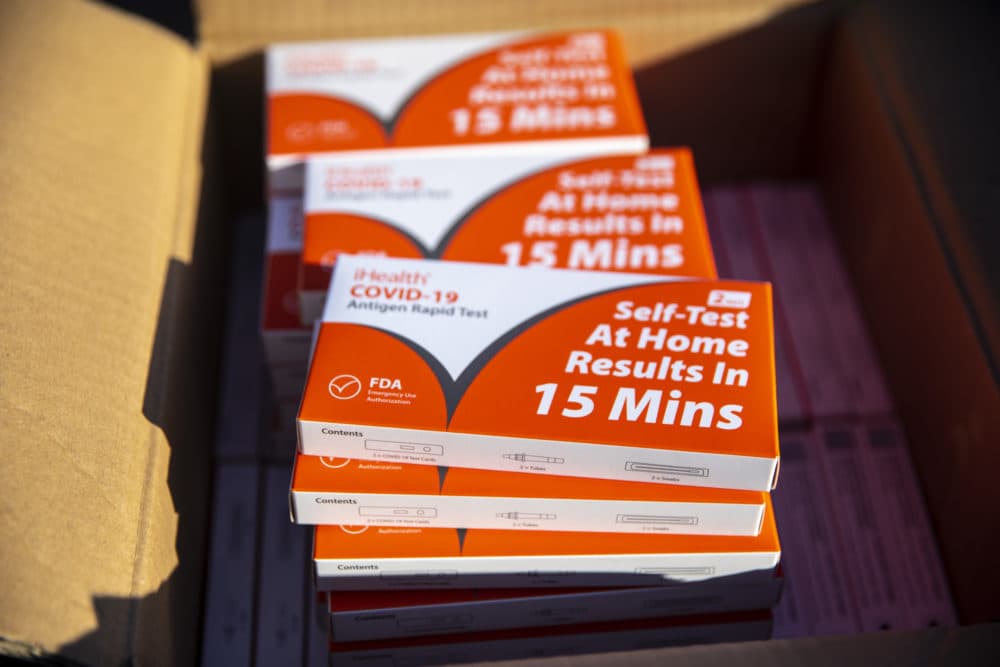Advertisement
Coronavirus Coverage
So far, Mass. residents have barely filed for COVID test reimbursements from insurers. Here's why

New numbers suggest that so far only a small percentage of Massachusetts residents have taken advantage of a new federal program that requires private insurers to cover the cost of rapid COVID tests.
In response to a request from WBUR, Blue Cross Blue Shield of Massachusetts reported roughly 0.5% of its eligible members filed for reimbursement for the tests between January 15, when the program went live, and the end of that month.
For Tufts Health Plan and Harvard Pilgrim HealthCare — which share a parent company — the number was even lower: fewer than 0.05% of eligible members either filed for reimbursement or got free rapid tests at select stores by presenting their insurance cards.
“I would expect the numbers to be low, but that's even lower than I expected,” said Atul Grover, executive director of the Research and Action Institute at the Association of American Medical Colleges. “I would expect at least getting into the single digits somewhere.”
The initiative, announced by the Biden administration at the height of the omicron surge, was intended to address criticism that COVID tests were too costly to use regularly. The program requires private insurers to cover the full cost of eight rapid tests per month for each member. Health insurers were given just five days to set up their programs and required to foot the bill.
Grover and other experts attributed low utilization of the programs to a variety of factors. Here are the top reasons they listed:
1. There Isn’t Enough Demand
There are several reasons why demand may be dropping.
For starters, the programs launched just after omicron peaked in Massachusetts. With falling cases, perhaps there is also falling demand for rapid tests.
“Northeast states are now happily descending in cases almost as fast as we went up. And so it could be that people are more comfortable and less likely to be seeking out those tests,” Grover said.
In addition, some people have questioned the accuracy of rapid test results. Polling from the Kaiser Family Foundation in January found that just 11% of respondents were very confident in at-home test results, and 44% reported being somewhat confident. This could, conceivably, lead to fewer people using rapid tests. (For the record, rapid tests have been shown to be highly accurate when they provide a positive result. They may be less accurate when they provide a negative result, particularly in the early days of infection.)
Another reason for lack of demand could be that people are finding the tests elsewhere for free — without having to wait for reimbursement from their insurer. Some Massachusetts residents can get COVID tests through their schools, employers or local distribution efforts. A federal program is also mailing four rapid tests to each household.
Advertisement
These alternative options may have “blunted the initial request for reimbursement through the insurance companies,” wrote Robert Carey, a health care consultant and member of the team that launched the Massachusetts Health Connector, in an email.
2. Getting Reimbursed Can Be Onerous And Confusing
“Many insurers have made the reimbursement process fairly onerous for the consumer,” said Sabrina Corlette, project director at the Center on Health Insurance Reforms at Georgetown University.
While the Biden administration set out some basic guidelines, each health insurer designed its own system, and many are evolving day-by-day. Experts says some of the systems are cumbersome.
Here are some examples: Some insurers are offering reimbursement once the member fronts the cost; sometimes this can be accomplished online, but it may require mail or fax. Other insurers have set up a network of local pharmacies where members can get rapid tests with no out of pocket costs. Yet some, like Blue Cross Blue Shield of Massachusetts, are still in the process of building those networks and plan to announce them soon.
“The harder it is for consumers to figure out how to apply for reimbursement and the more steps you make them take to get the reimbursement, the fewer people go through the trouble and the fewer claims you have to pay,” Corlette said, adding that her insurer required her to print out a form, cut barcodes off the test box and mail it all in.
She noted it’s highly unusual for health plans to cover anything that’s over the counter. “All of them are building this from scratch,” Corlette said.
Corlette believes it’s unlikely that either the federal government or health plan executives will invest a lot of time and energy in creating better systems. That's because the programs are set to last only until the end of the federal public health emergency, which is currently slated for mid-April, although it could be extended. So this rapid test program may only exist for three months.
3. Many Consumers Still Don't Know Their Insurance Covers Rapid Tests
“The most important thing to note is that this is still very early on,” said Lindsey Dawson, a policy analyst at the Kaiser Family Foundation, who has studied the rapid test market and reimbursement programs. Given how new the programs are, it's possible many people aren’t aware they even exist or have not yet looked into their own insurance company’s policy.
Carey, the health care consultant and principal at RLCarey Consulting, said it makes sense that people might not know about the programs. “There’s not been much of a marketing and outreach program by insurers [or] the government,” he wrote.
And, of course, some people may have purchased their eight rapid tests for January but not yet gotten around to filing for reimbursement.
Grover, of the Association of American Medical Colleges, said one key question going forward will be how many people take advantage of the programs in the months ahead — especially if and when another surge hits.
